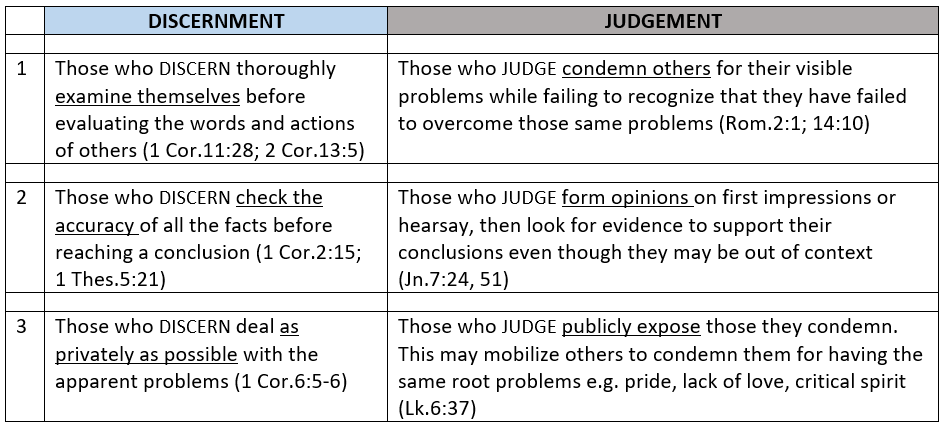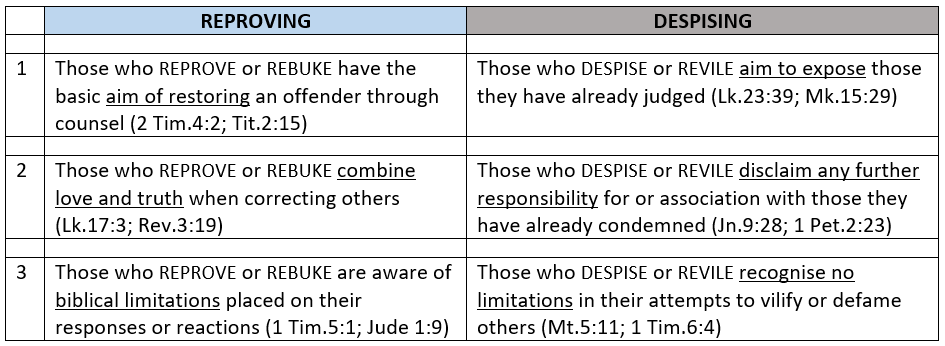Lesson #16. THE PROCESS OF RESOLVING CONFLICTS.
KEY TRUTH: Sharing the benefits of avoiding conflicts as well as biblical steps in resolving conflicts.
I. Avoiding conflict by watching how you use your tongue
- WE ALL OFFEND WITH OUR TONGUES: Everyone is keenly aware of the damage done by the wrong use of the tongue. James summed it up well when he wrote – 2 if anyone does not stumble in what he says is a perfect man … 8 but no human being can tame the tongue. It is a restless evil, full of deadly poison. 9 With it we bless our Lord and Father, and with it we curse people who are made in the likeness of God (Jms.3:2, 8-9).
- CONTROLLING YOUR TONGUE COMES BEFORE RESOLVING CONFLICTS: Before we examine how to resolve the damage done by conflicts, we need to avoid trouble in the first place. This is incredibly hard in a culture that respects few boundaries when it comes to slander and gossip. Our media feeds on fake news and stirs up conflict. Consequently, it requires determination to reject the slanderous example of the world that is an affront to God. Apart from the older generation that is not conversant with the latest technology, most people have a world audience that acknowledges few limits. We are wise to heed the warning of Jesus – 36 I tell you, on the day of judgment people will give account for every careless word they speak, 37 for by your words you will be justified, and by your words you will be condemned.” (Mt.12:36-37).
II. Responding to invitations to gossip and slander
- THE DIFFERENCE BETWEEN DISCERNMENT AND PASSING JUDGMENT: The Scriptures command us to ask questions, to examine, and to distinguish but never to sit in judgment on people. So what should we avoid and what should we affirm? …

- THE DIFFERENCE BETWEEN REBUKING AND DESPISING: The Bible calls us all to appeal, to urge, to plead, to encourage, and tell others their faults, but never to despise, to denounce, to insult, to vilify, or to abuse others. How do we know when we lapse from one to the other? …

- RESOLVE TO MININIMISE THE DAMAGE DONE BY NEGATIVE REPORTS: When asked to give a report or do a reference, it is usually unnecessary to go into negative details. A discerning referee can tell whether your endorsement is enthusiastic or cautious. You should refrain from negative comments behind a person’s back when you have never had the courage to speak ‘the truth in love’ face to face. Jesus gave this perceptive guiding principle – whatever you wish that others would do to you, do also to them, for this sums up the Law and the Prophets (Mt.7:12). Remember the far-reaching impact of the ‘bad report’ given by the ten Israeli scouts (see Num.Chpts.13-14). Since we all overstep the mark at times, determine to seek forgiveness from those you have offended. The Lord’s Supper provides a good opportunity to be reconciled with those we have offended (see 1 Cor.11:27-32). A good ‘Rule of thumb’ is to always ask God for forgiveness AS WELL AS from the person or persons that heard the offence. The humiliation involved in asking forgiveness from all effected parties is a great deterrent to ‘shooting your mouth off’ in future.
- BEWARE OF INFORMATION OFFERED ‘IN STRICTEST CONFIDENCE’: Whenever someone prefaces a conversation with ‘I tell you this in strictest confidence’ or ‘you must promise not to tell this to anyone else’, what follows is usually slander! You should point out that you will deal with the information biblically and suggest they refrain from giving you any information you are unable to verify or resolve with the parties involved. It is better not to be a party to something where you become part of the problem rather than part of the solution.
III. Bible check list to help us in taming the tongue
- BIBLICAL QUESTIONS TO FIND ROOT CAUSES: Before opening your mouth to defend or accuse, consider the following questions …
i. Does the conflict reveal that I am trying to be `boss’ of my life? (see Mt.6:33).
ii. Does the conflict reveal my lack of a servant’s heart? (see Lk.17:7-10).
iii. Does the conflict reveal that I have an attitude of pride? (see Jms.4:6).
iv. Is God using this conflict to lead me to greater godliness? (see 1 Pet.2:21).
v. Is the conflict a direct or indirect result of moral impurity? (see Ps. 66:18).
vi. Does the conflict indicate there are more people involved? (see Prov.6:2-5).
vii. Have I complicated the problem by being disloyal? (see Prov.16:28).
viii. Do I need to humbly seek forgiveness from the other person involved? (see Mt.5:23-24). - BIBLE PRINCIPLES TO HELP US LIMIT THE HARM CAUSED BY THE TONGUE: Disharmony in a church is one of the greatest inhibiters to health and growth. For that reason, we should all develop a greater sensitivity to the harm done by our tongue …
i. Listen to your words through the ears of others BEFORE you say them (see Ps.19:14).
ii. Discern the receptivity of your hearer BEFORE, DURING, & AFTER you speak (see Ps.55:21).
iii. Keep your heart in tune with God by reading God’s Word each day (see Ps.119:9, 13).
iv. Encourage your friends to tell you when your words offend (see Prov.17:6; 27:6).
v. Ask forgiveness for any unloving attitudes or words you display (see Mt.5:23-24).
vi. Fulfill PAST promises and be cautious about making any FUTURE ones (see Mt.5:33-37).
vii. Assume responsibility for your facial expressions and every word you speak (see Mt.6:1 & 5).
viii. Aim to always give a good report and follow Matthew 18 when necessary (see Mt.18:15-17).
ix. Dedicate your heart and tongue to the Lord daily (see Rom.12:1).
x. Decide to give words that comfort, edify, encourage, and inspire (see Heb.10:24-25).
IV. Resolving conflicts and disputes
- WE SHOULD DISPLAY LOVE TOWARD ONE ANOTHER AND STRIVE FOR UNITY: Jesus gave the Twelve the New Commandment in the Upper Room discourse to love one another (see Jn.13:34-35). In the original Greek, the command in Ephesians 4 is stronger and more like – ‘fighting not to fight’ and so – 3 … to maintain the unity of the Spirit in the bond of peace (Eph.4:3). Unity does not just happen without striving and taking action to preserve peace and oneness in the church.
- JESUS ESTABLISHED PRINCIPLES TO RESOLVE CONFLICTS: All conflicts should be resolved according to what is known as ‘The Matthew 18 Principle’ – 15 “If your brother sins against you, go, and tell him his fault, between you and him alone. If he listens to you, you have gained your brother. 16 But if he does not listen, take one or two others along with you, that every charge may be established by the evidence of two or three witnesses. 17 If he refuses to listen to them, tell it to the church. And if he refuses to listen even to the church, let him be to you as a Gentile and a tax collector (Mt.18:15-17 c.f. Mt.5:23-24).
(i) STEP ONE – RESOLVE A DISPUTE BETWEEN THE PARTIES: Conflicts between people in the Church should be resolved PRIVATELY between the parties involved (see above in Mt.5:23-24; 18:15).
(ii) STEP TWO – SEEK THE HELP OF A COUNSELLOR: Should that fail, the parties in the dispute should invite one or two mature members of the Church to establish the facts of the case, and to help them apply the relevant principles of the Bible (see above in Mt.18:16 c.f. 1 Cor.6:1-6).
(iii) STEP THREE – AS A LAST RESORT, BRING THE MATTER BEFORE THE CHURCH: Should parties refuse to take the recommended action to resolve the conflict then it should be brought before the Church Eldership for further action including possible dismissal from the Membership of the Church (see above in Mt.18:17 c.f. 1 Cor.5:5; 2 Cor.2:5-11; Jms.5:19-20).
(iv) THROUGHOUT – THE PROCESS SHOULD BE DEALT WITH IN LOVE AND AS PRIVATELY AS POSSIBLE: All these steps should be done as privately as possible to minimize gossip, slander, and division in the Church (Mt.18:15; Lk.17:3-4; Rom.16:17). Remember that Jesus reached out to Tax collectors and sinners and treated them with love (see Mk.2:14-17).
V. Steps to gaining a clear conscience
- A CLEAR CONSCIENCE HAS FAR REACHING BENEFITS: Like us all, David sinned against God. However, he could testify to the blessing of clearing his conscience before the Lord (see Ps.32:1-5).
- A CLEAR CONSCIENCE IS INDISPENSABLE IN MINISTERING TO OTHERS: It may be defined as follows …

- RESOLVING DIFFERENCES IS OFTEN DONE BADLY: There are many reasons why attempts to resolve differences and conflicts fail …
- IT NEEDS TO BE THE RIGHT TIME & PLACE:
- Select a convenient time to resolve the conflict when you won’t be interrupted.
- Take into account the seriousness of the offence. Has the other party had time to work through the pain and outrage?
- IT NEEDS TO BE THE RIGHT METHOD:
- Face to face or a phone call gives you the advantage of adjusting to the circumstances.
- A letter can be misunderstood, misinterpreted, and held in evidence against you.
- IT NEEDS TO BE THE RIGHT APPROACH:
- Confess only to those offended. Don’t involve others in your confession.
- Clear the greatest offence first. Avoid giving sensual details.
- Be as brief and clear as possible. Prolonged discussion can reopen wounds.
- Don’t defend yourself. Refrain from putting words into the mouth of the other party.
- Expect possible rejection of your request. You cannot demand forgiveness. Only God can pardon you.
- IT NEEDS TO BE THE RIGHT WORDING:
- The Holy Spirit will reveal those with whom you need to be reconciled (see Mt 5:23-24).
- Seek forgiveness for the main offence and the hurt caused by your words and actions.
- Carefully choose the right wording to identify what you have done (see Lk.15:17-21).
- Yours words must reflect full repentance and sincere humility without excuses or blame-shifting …
EXAMPLE: God has convicted me that I was wrong in … (identify the wrong). Will you forgive me?
1. Forgiveness will enable us to share the same openness with the offender after an offence as before.
2. In forgiveness, I yield to God the right to deal with the offender (see Rom.12:18-19).
3. One of the most difficult offences to forgive is betrayal by your partner or friend.
- IT NEEDS TO BE THE RIGHT TIME & PLACE:
GROUP DISCUSSION
- Do you find it harder not to offend with your tongue than taking steps to resolve conflicts? Why?
- What changes will you make to minimize the damage done by your tongue?
- Do you have a clear conscience about offending others? Do you need counsel to gain clarity on resolving these conflicts? What are the next steps?
- Why are special warnings given to leaders in dealing with offences? (see Gal.6:1; Jms.3:1).
